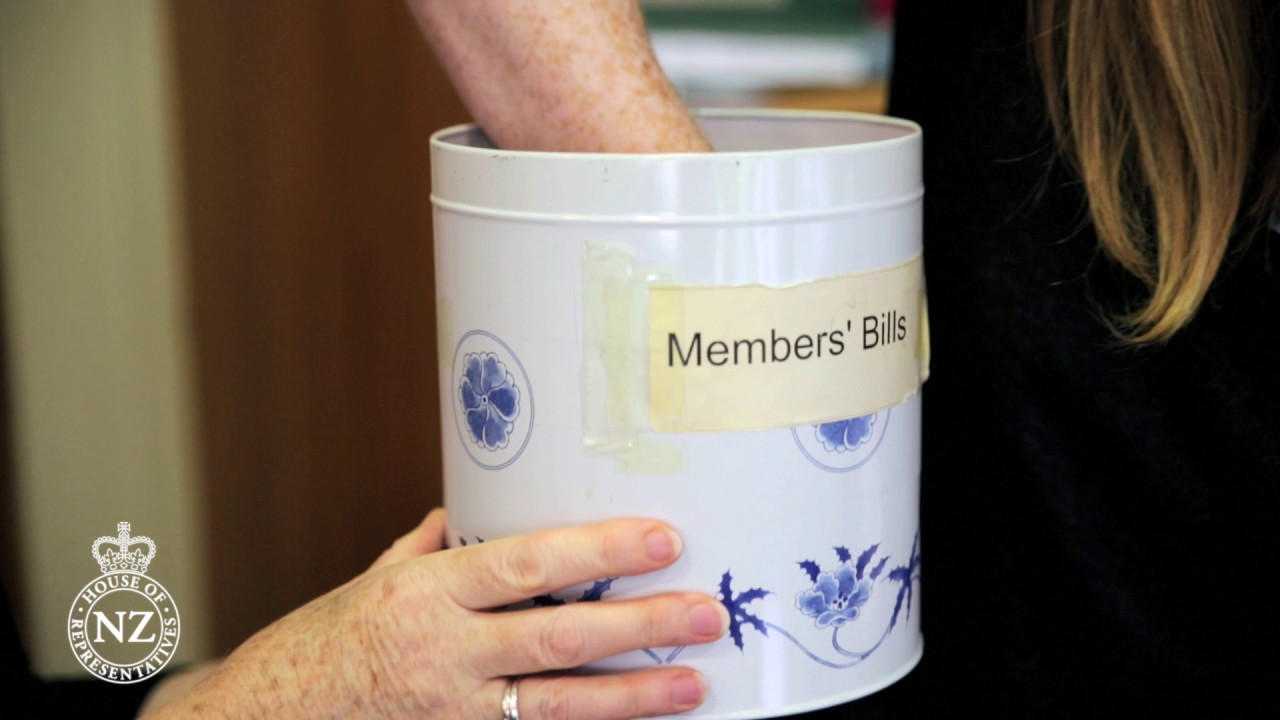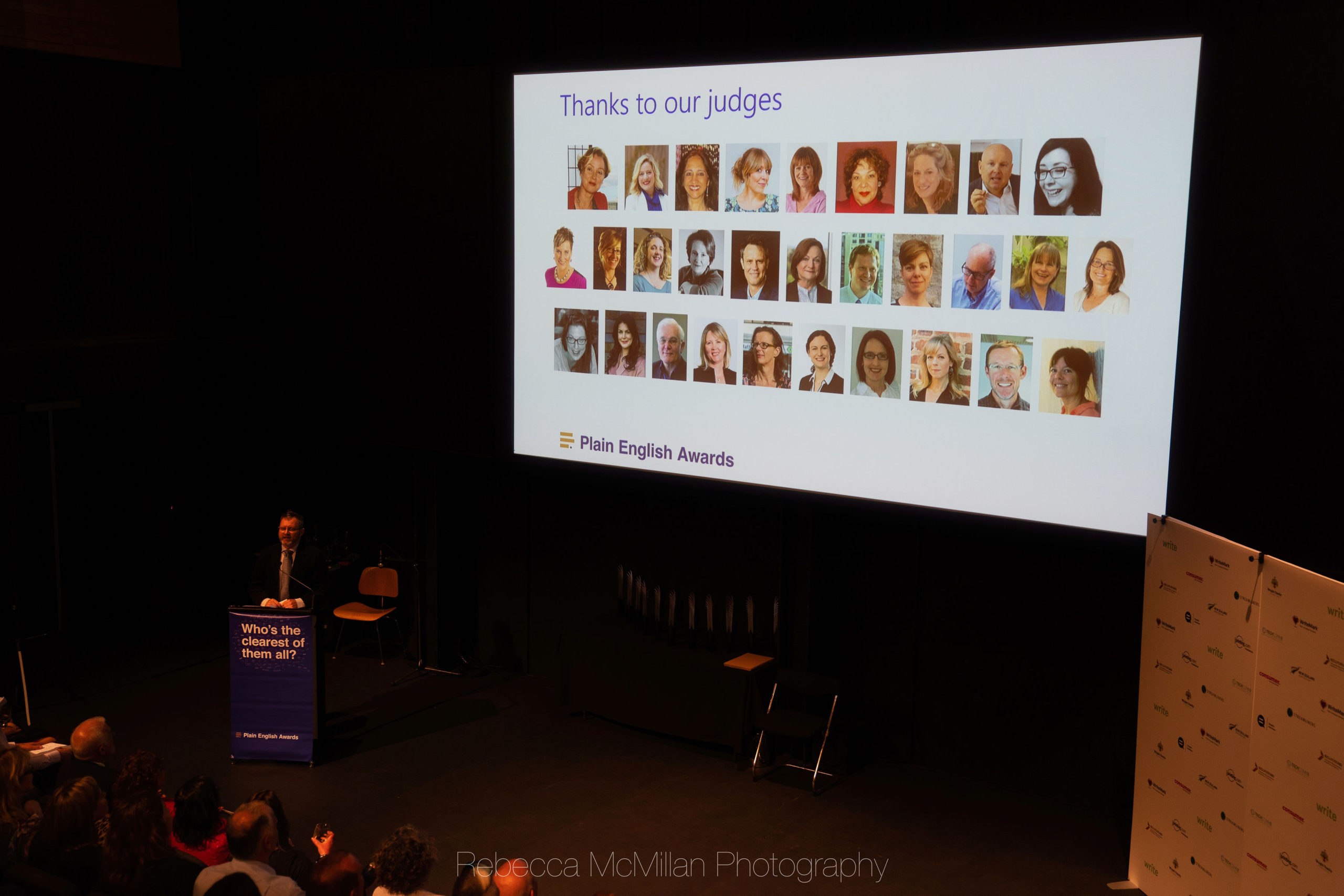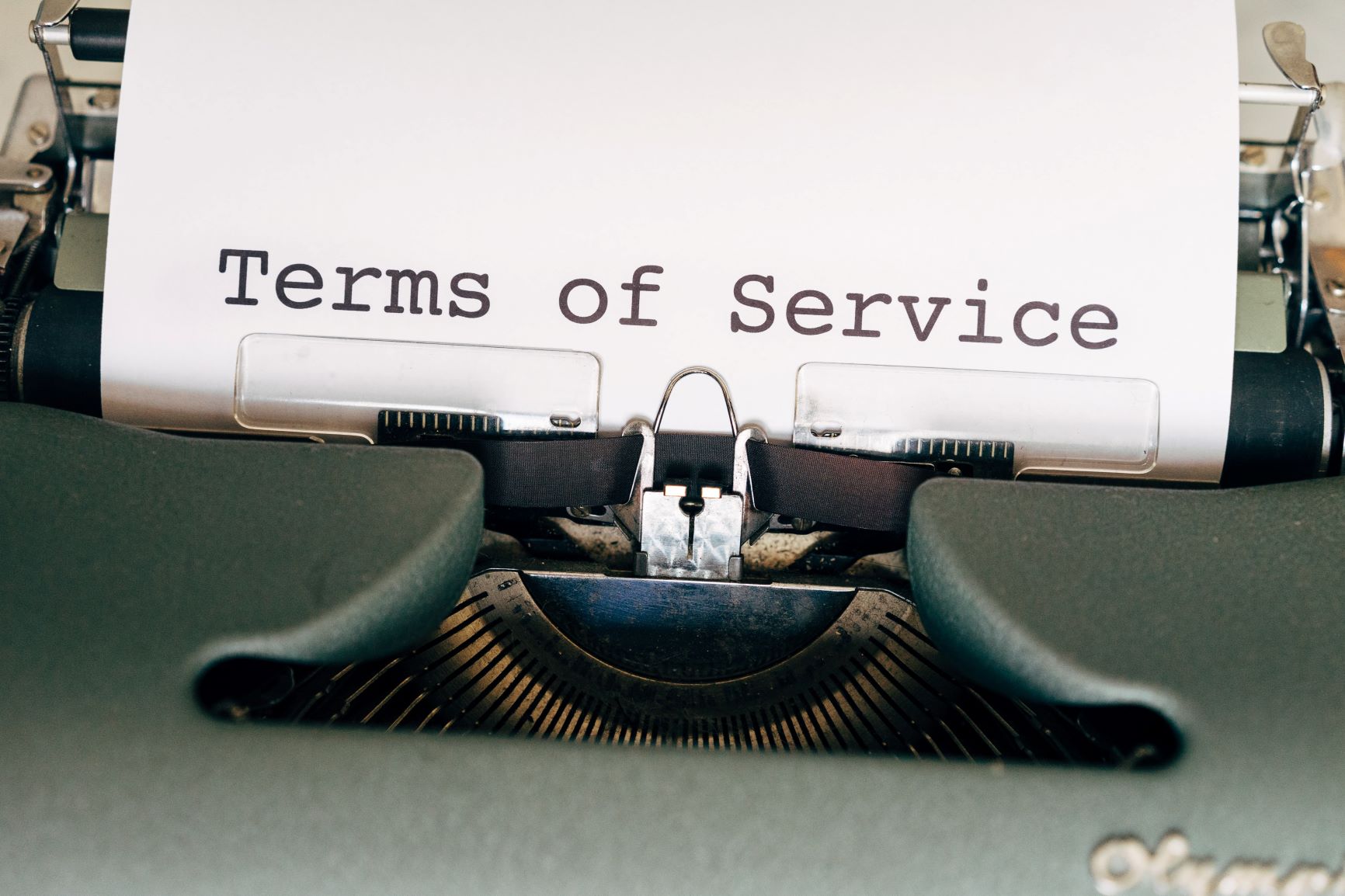
Reach for the stars by transforming your legal documents using plain language | Photo by Graham Holtshausen on Unsplash
Legal writing doesn’t need to be legalese. The judges for the Best Plain Language Legal Document are looking for excellent examples of legal writing that push the boundaries of what we might think legal writing typically looks like.
No longer stuffy or wordy, filled with passive voice or obfuscation, today’s legal writing is clear and concise yet still legally rigorous.
The judges of last year’s winning document said:
The document feels friendly and manageable. It skilfully employs all the right plain English and clear design techniques. Its language and layout make understanding it as easy as it can be without losing its legal rigour.
And they commented on the design of the document too:
Plenty of white space with tables, diagrams and worked examples used to help convey information. Good consistency in heading size and use of colour.
The document has a good tone. It’s friendly but professional — and that’s not always an easy balance to strike.
Clarify the complex
Plain legal documents do a great job of clarifying the complex so that you don’t need a law degree to understand the content.
The judges were also impressed by one of last year’s finalists:
The language used is mainly plain and great care has gone into making sure complex rules and processes are explained as clearly as possible.
Of another finalist they said:
This report is very easy to navigate, particularly considering the complexity of the information presented. It tackles a complex (and potentially eye-glazing) subject very well. It’s a visually appealing document with great use of colour and graphics. The structure works well with a logical flow and the essential, need-to-know information is clearly presented. An excellent job all round.
Enter your plain legal document
The judges are looking for the best example of a legal document written in plain language. You can enter a document used in legal contexts or for legal purposes. Examples include contracts, agreements, terms and conditions, notices, deeds, judgments, legal opinions, and so on. The document may cover a legally enforceable Act, process, obligation, or right.
Here are the judging criteria. And remember the judges will also be keen to know if you’ve evaluated your document in any way, such as carrying out document user-testing.
Purpose
The purpose of the document is clear at the start, and the content supports the purpose of the document.
Structure
The structure is clear and logical to the reader.
Headings and main messages
The headings are informative and clearly signpost the main messages.
Paragraphs
The paragraphs are mostly short and focused on one topic.
Sentences
The sentences are mostly short and straightforward.
Words
The words are precise and familiar. Technical terms are explained.
Layout and presentation
The layout helps the reader absorb the messages quickly and easily.
Check out the criteria for the Best Plain Language Legal Document
Meet the 2021 winners and finalists for the Best Plain Language Legal Document
Meet the judges for the Plain Language Awards
Anne-Marie Chisnall July 21st, 2022
Posted In: 2022 Plain Language Awards, Communications, Legal writing
Tags: agreements, Best Legal Document, Best Plain Language Legal Document, clear writing, contracts, Legal writing, policies, terms and conditions

The Plain Language Bill was drawn from the parliamentary biscuit tin on 23 September 2021
We were thrilled to welcome Nelson MP Rachel Boyack as guest speaker at the Plain English Awards ceremony on 14 October 2021. Her speech is below and it’s a great read! Rachel speaks from the heart about her enthusiasm for clear communication and its benefits for New Zealanders. She especially encourages supporters of plain language to support the new Plain Language Bill as it progresses through Parliament.
Welcome by Awards MC James Elliott
Now it’s my pleasure to welcome our guest speaker for the Awards. This is Nelson MP Rachel Boyack. As we said earlier, Rachel’s private member’s bill, the Plain Language Bill, was recently drawn in the parliamentary ballot. So it’s very fitting that Rachel joins us today to be our guest speaker. And with the potential for the Plain Language Bill to become law, New Zealand could join the countries around the world that have a legislative basis for plain language in their government agencies and public communications documents. Thank you for joining us, and welcome Rachel.
Rachel Boyack’s speech
View the video of Rachel’s speech at the Plain English Awards ceremony

Rachel Boyack MP: Champion of plain language
Tēnā koutou katoa. Ngā mihi nui ki a koutou
It is an honour to join you today and to have the opportunity to speak to you about my private member’s bill, the Plain Language Bill. My thanks to the team who have worked so hard to put on these Awards today during a pandemic. It’s no easy feat.
Congratulations to all of the nominees, finalists, and award winners celebrated today. Thank you for your commitment to plain language and your willingness to put yourselves forward for judging. While it is always risky singling out one organisation for praise, as the MP for Nelson, I am pleased to see Cawthron on the list of finalists today. I’m proud to be a trustee of Cawthron, and I acknowledge their commitment to good science communication. The last two years are a stark reminder of why good science communication is so important.
It is somewhat nerve-wracking to be speaking to a group of communications experts about a Plain Language Bill. Since my bill was drawn from the parliamentary biscuit tin, I had been very mindful that all of my communications must be crystal clear. I would like to acknowledge my colleague, Chris Hipkins, who was the original drafter of the Plain Language Bill almost 10 years ago.
As a new MP, I was asked to take on this bill. And there was a reason that I was delighted to do so. Fifteen years ago, I was a fresh young graduate starting my professional career in a small public sector agency in Wellington called the Leadership Development Centre. I was given a role in communications despite having no formal training in this type of work.
My boss, who was a pedant, sent me on a number of plain English courses with Write Limited. The training from Write set me up in my professional career, and has helped me to ensure that the documents and statements I produce are clear and easily understood. The first thing I did after having my bill drawn was to ask my assistant to ring Write and set up a meeting.
I am keen to work with the sector and all of you, the plain language champions across Aotearoa, as my bill progresses. The purpose of my bill is to require public sector agencies to write their documents and their website content using plain language. Agencies will have a plain language champion who will be responsible for training staff and reporting to the Public Service Commission about plain language use in their agency. Members of the public will be able to raise concerns about documents with the plain language champions.
Plain language is a democratic right. My goal is for more people to have good communication from government agencies so that we can all participate fully in our democracy. I would love your help turning this bill into law. As the bill progresses through Parliament, I am keen to hear from the sector about how we can make the law work better. This is also an opportunity for us to speak out about the benefits of plain language in the public and private sector. So let’s use it.
Thank you again for inviting me to speak to you today. Congratulations to the award winners.
Tēnā koutou, tēnā koutou, tēnā koutou katoa
Meet the Awards winners for 2021
Becoming a country of clarity: more about the Plain Language Bill
Plain Language Bill aims to end bureaucratic bluster
Plain Language Bill not just about ‘dumbing things down’, coach says
Anne-Marie Chisnall November 4th, 2021
Posted In: 2021 Awards ceremony
Tags: champions, clear writing, Plain English Awards, plain language, Plain Language Bill

Looking forward to celebrating this year’s winners | Photo by Universal Eye on Unsplash
Our international panels of judges have settled on this year’s finalists.
Find out which entries made the grade
So, what made an entry good enough to become a finalist this year? Here’s a taste of what our judges had to say:
[The writer] is fighting against engrained writing attitudes, including in [their] company, which is quite courageous.
I found the content incredibly compelling. The language, structure and visual devices beautifully enhance this detailed and informative content.
The combination of plain writing and relevant graphics make [this document] a joy to read.
[This document] is an excellent example of keeping anxious people informed on a critical topic.
We’re now counting down to our virtual Awards ceremony on Thursday, 14 October, where we’ll announce and celebrate this year’s winners.
Find out more about our ceremony plans
See who entered the Awards in 2021
Meet our judges
Melissa Wardell September 15th, 2021
Posted In: 2021 Plain English Awards, Communications, Finalists
Tags: 2021 Plain English Awards, Best Organisation, Best Plain English Communication, Brainstrain, Champion, clarity, clear communication, clear writing, judges, recognition

Don’t panic! You’ve got extra time to get your Plain English Awards entries in | Photo by Lukas Blazek on Unsplash
We know what it’s like to be busy, and how difficult it can be to meet deadlines when the pressure’s on. That’s why we’re giving you extra time to submit your Plain Language Awards entries.
Entries for the 2022 Plain Language Awards will now close at 5pm on Tuesday, 2 August.
Get the recognition you deserve for your clear communications
The Plain Language Awards are one of New Zealand’s leading industry awards. Imagine how good you and your team would feel if you became a finalist … or even a winner?!
Find out more about our Awards categories
Get some inspiration from our past winners
Nominate the good and the bad for People’s Choice
Dob in a bad document, or praise an easy-to-read one! The more the public speak up and demand plain English, the easier it is for us all.
Power to the people — vote for plain!
Have you read something that strained your brain? Nominate it!
Get involved with the People’s Choice
It only takes a sentence!
If you’re short on time, enter a few beautifully transformed sentences for the Best Plain Language Sentence Transformation award.
Well-written sentences create a fine reading experience
Enter your transformed sentences by 2 August
Nicola Welby July 29th, 2021
Posted In: 2022 Plain Language Awards, Best Plain Language Sentence Transformation, Communications, Industry awards, People's Choice awards, Social good
Tags: Best Plain English Communication, clear communication, clear writing, Industry awards, People's Choice, Plain English Awards

Breathe new life into your documents and make them worthy of the Turnaround Award | Photo by Bryn Parish on Unsplash
What does it take to win the Best Plain Language Turnaround category? What does a winning entry in this category look like?
More than an edit or redesign
A top submission in the Best Plain Language Turnaround category will be more than an edited version of an original document. It’ll be more than a website that has been redesigned. More than information that has been restructured to be more reader-focused. More than information that has been user-tested for its target audience.
Coming from a place of care
A winning entry in the Best Plain Language Turnaround category will include many of the above qualities and then some. Above all, it will clearly have come from a place of care. An individual or team will have looked at the communication and thought, ‘This information is important and the people it’s serving deserve our time to make the information better serve its purpose’. In other words, the writers will be caring for their readers.
What judges have said about previous winning entries
Have a read of what our judges have said about some of our past turnaround winners.
Winner 2018: Infinite Possibilities Limited
‘This is a damn clever turnaround. I couldn’t stop thinking about it.’
‘A remarkable change! You’ve taken a legal document and turned it on its head. It’s brilliantly unconventional, witty, exudes personality, and was a pleasure to read.’
‘The word choice is casual and direct with a very distinct tone. Some people will clearly consider it unbusiness-like and will not do business with this company. Others will find it refreshing and will move forward — exactly the intent to weed out those clients who find it offensive and to sign on those who find it refreshing.’
Winner 2017: Ministry of Civil Defence & Emergency Management
‘This is a terrific turnaround from a dull, wordy website to one that is lively, engaging, and easy to navigate. This organisation has done a great job of using multimedia, and their restructuring of the content works really well.’
‘The scenario-based navigation on the home page is friendly, colourful, and relevant, and this flows well into the more text-heavy pages further down in the site. The scenarios capture the reader’s attention and the short videos are hilarious — a great way to get people involved in thinking through how to be ready for a disaster or emergency.’
‘The layout and formatting are much cleaner, with good use of white space and headings to focus the eye. The tips are helpful and the key messages are brought to the fore much more than in the original. Great work!’
Winner 2015: OSPRI
‘You’ve done a great job with this rewrite. It’s a vast improvement on the original. This is a usable and useful document, which does the job well. Nice work!
Find out more about the Best Plain Language Turnaround category
Melissa Wardell July 9th, 2021
Posted In: 2021 Plain English Awards, Communications, Plain English Awards, Plain English Turnaround
Tags: 2021 Plain English Awards, Best Plain English Turnaround, Best turnaround, clarity, clear communication, clear writing, plain language, Turnaround Award, writing for the public, writing for the reader

Thanking our judges at an Awards ceremony | Photo by Rebecca McMillan Photography
We asked our judges for some insider advice and tips to pass on to people considering entering the Awards.
And as usual, they were more than happy to help out!
We asked our judges:
- what aspects of an entry makes them think ‘this one is a winner’
- what their top piece of advice was for someone entering the Awards
- what common missteps they see that quickly let them know an entry won’t be a finalist
- what they thought were the most notable features of winning entries from past Awards.
This type of entry is a winner
One judge liked entries that surprised them and surpassed their expectations.
Others said, ‘First impressions are crucial. For me, if the structure is helpful and logical, the language simple and clear, and the tone friendly and engaging, then the authors will definitely be in the running to be winners’.
‘The language will be the equivalent of plain speaking — ordinary, everyday language throughout the text. The document will do the job the writer describes to us.’
‘I think for me that’s when I can feel that the writer has put the effort in to realise that they are writing for a reader. It might not be perfect, but you can tell that they are thinking about the receiver of the message.’
‘It’s how the authors weigh and balance the various aspects and elements of the communication — the audience and its needs, the situation and its urgency or characteristics, the political charge of the situation and people’s reaction, and how all of that has an impact on the message, tone, word choice, sentence construction, images — and when they tell me that they have talked to the intended audience, instead of just assuming they got it right. When all of these things are cohesive, I know I have a winner.’
‘Simplicity and clear evidence of designing the information for the audience.’
Our judges’ top pieces of advice
Our judges want entrants to put themselves in their readers’ shoes. They want you to forget about yourself and your message. Just ‘focus on your readers’, one said, and we agree. Your audience is, after all, what really matters.
Always put yourself in your readers’ shoes. You wouldn’t want to wade through dense, long-winded, jargon-filled reports. Neither do your readers!
Another common theme from our judges was:
Keep it simple!
Here are some other top tips from our judges.
- Don’t get in your own way.
- Leave your ego at the door.
- Brevity is the currency of good comms.
- Think outside of the box, talk to talk to your customers, ask them what they want and need, get to know them. And … surprise yourself!
- Avoid bureaucratic language, particularly impersonal, passive, or pompous sentences.
- Keep it short, sweet, and simple! (No one wants to read lots on a screen.)
- Make a human connection. Show that your piece reaches its audience and has results. Show that every decision was carefully made based on evidence, not assumptions. And even better, try to show documented results — fewer phone calls, more returned surveys, bills paid sooner.
Common missteps judges see in entries
Here’s more on what to avoid, with some examples from the judges of missteps in entries that didn’t make the grade.
Lack of focus on the intended reader
- Too much focus on their own story
- Using their company name over and over again, instead of using ‘us’ and ‘you’
- Text that suggested that the writer wanted the message or the organisation to seem important
Unclear purpose
- A lack of attention to the purpose of the entry. ‘With no ‘care’, probably no need to share…’
- Failing to talk about the goal of your piece in terms of what you want your audience to be able to do with the information
Language-related problems
- Using unfamiliar words in place of everyday words that most people will easily understand
- Too many words, repetition
- Vague language, jargon, or management clichés
Lack of testing or evaluation
- Not being able to show that you tested your piece with your intended audience, no matter how limited the testing
- Not being able to show how you used feedback to improve the document or website
Stronger editing or design needed
- Clumsiness in the writing
- Too much text and not enough white space
- Not being able to explain why you made a choice about design or word choice based on your intended audience.
- Overwriting — including information that just dilutes the purpose of the document — and a lack of tailoring
The most notable feature of past winning entries was putting the reader first
Judges all agreed that putting the reader first was the way to a winning entry. ‘Clarity and consideration of the audience’, said one judge.
Winning documents were thoughtfully and helpfully laid out, using clear and simple language, and in an engaging tone that inspired trust.
‘They all really moved into the heads of their readers’, one judge said. ‘What questions do they have? How can we answer those questions as clearly as possible? How can design help us? What tone of voice is needed?’
‘We have been unanimous in selecting entries that showed unusual skill, such as explaining bowel cancer with sensitivity and clarity. Others have explained complex topics in everyday language.’
‘I’ve only judged the Best Plain English Sentence Transformation before … ‘short and active’ were the two main ingredients!’
‘One of the most memorable entries I judged several years ago was a newsletter updating residents about a major road closure that was going to last several months. The details were highly technical; the inconvenience was very high for anyone who used the road. But the newsletter used similes and metaphors to explain the technical aspects; for example, ‘We need to remove the equivalent of two soccer arenas of rock’. The writer used humour and truth and, as a result, built the trust of those who read it. It could have been a boring weekly update, but instead was an engaging read in terms that even a non-engineer — who didn’t live anywhere near there — could understand. That was understanding the audience and the situation and creating something more.’
‘A conversational tone. And good design (white space, colour, graphics, and so on).’
Some extra wisdom from our judges
Our judges wanted entrants to enjoy the process. ‘The standard has been rising over time’, one said. ‘Even to be chosen as a finalist is impressive and should go in your CV. The ability to write in plain English is in demand around the world.’
Another judge added, ‘It’s a great way to get valuable personal feedback on your writing! And you support plain language for everyone, no matter what someone’s abilities or background are. A great cause.’
‘No matter the outcome for your entry this year, read the comments of the judges with interest. For the most part, they will give you insights on how to approach about your next communication in a richer way.’
‘Plain English is not an add-on to good business writing — it is good business writing.’
Read Trophy Tips: Top tips from past winners
Find out more about this year’s judges
Watch videos by some of our judges in our gallery
Nicola Welby July 5th, 2021
Posted In: 2021 Plain English Awards, Communications, Judges, Plain English Awards, Trophy Tips
Tags: clear communication, clear thinking, clear writing, Finalists, improved writing, insights, plain English, Trophy Tips Seminar, winners

Will you join our prestigious list of winners? | Photo of 2018 Award winners by Rebecca McMillan Photography
We asked past Award winners what appealed to them about entering the Plain English Awards, what advice or feedback they got from the judges, and what tips they’d give to anyone entering this year.
We hope you find these tips useful!
We asked our winners:
- why entering the Awards appealed to them
- what features of their entry the judges appreciated the most
- what they would do differently if they entered the 2021 Awards
- what their top piece of advice was for this year’s entrants.
Why entering the Awards appealed to our past winners
- ‘We knew what we were doing was important and wanted to share that with other people who care about plain English.’ (Plain English Champion winner)
- ‘I met someone years before who’d entered and won an award, so for me it was a development goal to work towards. I wanted to become good enough, consistent enough and confident enough in what I do to deserve one of these awards. I also wanted to connect with people in similar roles to me and support and celebrate their achievements too.’ (Plain English Champion, Best Plain English Sentence Transformation winner)
- ‘I believe plain English is so important in society and I wanted to be a part of making change. I loved the challenge of making a technical document plain!’ (Best Plain English Document — private sector winner)
- ‘I think good technical communication deserves to be celebrated, and I love a challenge! Plus I thought that if I won, the award would look good on my desk and in my CV.’ (Best Plain English Technical Communicator winner)
The judges appreciated easy-to-read letters with a personal tone and clear design
The judges appreciated documents that were well structured and elegantly designed. They appreciated that a team effort often plays a part in improving communication. The judges also felt enthusiasm for plain English coming across in personal tone and were impressed by the entrants’ dedication to using both plain English and smart design to make their organisation’s communications clearer.
Judges also liked seeing great layout, and technical language explained clearly.
One winner said that the most powerful thing they did was include quotes from people on a benefit. ‘We had people thanking us for sending them easy to read and kind letters.’
Our winners said they could always find room for improvement
One said, ‘I’d take everything I’ve learnt since I last entered, and talk about that — the challenges, the new thinking, the lessons learned, the new responsibilities, and the successes.’
‘I would include more about the difference it made to people’, said another.
One entrant entered an instruction manual that was designed for the web, including drop-boxes that opened on click. As this was not a public-facing website, the entrant had to provide the content in Word, which wasn’t ideal. They said that in future they’d choose examples that they could provide in a more accessible format.
Our winners shared their top pieces of advice for someone entering the Awards
- ‘You have to really care about your entry and what you worked on.’
- ‘Structure your supporting evidence well, to make the value you’ve added to plain communication really clear and convincing for the judges.’
- ‘Design is as important as the plain English words used. Your layout is an integral part of plain English, as are any design features used.’
- ‘It sounds obvious, but make sure you read “What you need to know” for the category, and make sure you provide judges with everything they are looking for.’
Some more words of wisdom from our winners
Our winners agreed that ‘plain English is underrated, yet crucially important’. They also felt it was fantastic to be part of the plain English movement.
A plain English document can win your business customers, save readers valuable time, improve your organisation’s credibility, and even save lives.
The Awards recognise that it’s not always easy to keep things simple — our project was really daunting — but it’s so important.
The Awards have a really fantastic celebratory vibe. Even if you don’t win, it’s a great achievement to be a finalist and support other finalists, and to be part of an important movement in New Zealand.
Thanks to all our past winners for their valuable advice! We hope all our entrants get as much out of entering the Awards process as valuable as our past winners have!
Read Trophy Tips: In the words of our judges
Read about past award winners
How to enter the 2021 Plain English Awards
Nicola Welby July 5th, 2021
Posted In: 2021 Plain English Awards, Plain English Awards, Trophy Tips
Tags: clear communication, clear thinking, clear writing, Finalists, improved writing, insights, judges, plain English, Trophy Tips Seminar, winners

The judges are looking for easy-to-read legal documents | Photo by Markus Winkler on Unsplash
What’s the number one thing a reader of a legal document is looking for? We’d like to suggest that it’s clarity! Readers of any writing — including legal documents — are looking for a document they can read once, understand, and act on.
Read the full version of a definition of plain language by the International Plain Language Federation
The award for Best Plain Language Legal Document celebrates legal writing that gets its point across without that legal flavouring that we’ve seen so often. How often have you encountered words like these in a legal document — furthermore, notwithstanding, prior to, accordingly? And what about commence, expedite, or terminate?
Let’s see some legal documents that push the boundaries of ‘plain’
The winners of the Best Plain English Legal Document in 2018, Draper Cormack, pride themselves on communicating clearly and directly with their clients. And the judges agreed that they were doing a great job of clear communication with their terms and conditions. The judges said:
This document is written in a way that gives the intended audience a strong chance of understanding it at the first reading, and in the way the drafter wants them to. It’s clear, direct writing, using as few words as needed, and avoids being ambiguous, lengthy or technical writing and complex sentences.
Overall, it is a good example of what you can do with a legal document.
The other finalists, Infinite Possibilities and Hatch, also made clarity a key feature of their communication with their customers.
Check out a legal document with a difference in the client relationship agreement from Infinite Possibilities
And take a look at Hatch’s terms too. The judges said:
Overall this document shows what plain English can achieve in the law. The target audience is written to in a language it can understand and act upon with confidence. The flow of ideas is logical and the design is clear and concise. [The document’s audience] would easily and quickly grasp its implications.
What the judges are looking for
The judges are looking for the best example of a legal document written in plain language. You can enter a document used in legal contexts or for legal purposes. Examples include contracts, agreements, terms and conditions, notices, deeds, judgments, legal opinions, and so on. The document may cover a legally enforceable Act, process, obligation, or right.
Here are the judging criteria. And remember the judges will also be keen to know if you’ve evaluated your document in any way, such as carrying out document user-testing.
Purpose
The purpose of the document is clear at the start, and the content supports the purpose of the document.
Structure
The structure is clear and logical to the reader.
Headings and main messages
The headings are informative and clearly signpost the main messages.
Paragraphs
The paragraphs are mostly short and focused on one topic.
Sentences
The sentences are mostly short and straightforward.
Words
The words are precise and familiar. Technical terms are explained.
Layout and presentation
The layout helps the reader absorb the messages quickly and easily.
Watch videos from our judges of the legal category in our gallery:
More about the Best Plain Language Legal Document category
Anne-Marie Chisnall June 9th, 2021
Posted In: 2021 Plain English Awards, Communications, Industry awards, Legal writing, Plain English Awards
Tags: 2021 Plain English Awards, Best Legal Document, clear communication, clear thinking, clear writing, improved writing, Legal writing, legalese, writing for the public

We’re excited to announce that entries are open! | Photo by James Lee on Unsplash
The Awards are officially open for entries in all categories. After a break in 2020, the Awards are back for 2021 — and they’re better than ever! We all saw the amazing benefits of clear and plain communications from the Government and health agencies. This heightened awareness of clear communication has set the scene beautifully for the return of the Plain English Awards.
Here’s what you need to know about the Awards in 2021. We’ve got a new unifying theme for the Awards, a combination of new and familiar judges, and all your favourite categories.
Tell the story of your plain language project
This year we’ve introduced a Story theme — and we’re offering you the chance to share your plain language stories through our video gallery. We’re particularly looking for people in workplaces to share stories about the benefits of their plain language projects. No project is too big or too small!
These stories will inspire others to embrace the benefits of plain language for organisations and their customers. We hope the gallery will become a go-to resource for people to get plain language inspiration.
Our judges and sponsors are joining in the fun as well. You can share a video without needing to enter the Awards. But we hope you’ll feel inspired to enter once you read about the available categories.
Check out the first videos in the gallery
Meet our judging panel
From Dunedin to Denver, Gisborne to Edinburgh, this year’s judging panel is made up of plain language experts from around New Zealand and the world. You’ve met some of them before and others are joining us for the first time in 2021. Together they make up an experienced and insightful team of plain language pros!
Find out more about this year’s judges
Choose your Awards category and get your entry ready
The Awards have a range of categories to suit almost every type of document (and websites).
If you’re starting off or pressed for time, you might consider entering the short and sweet Best Plain English Sentence Transformation. If you’ve transformed a whole document, you might be ready for the Best Plain English Turnaround. You can enter a Best Plain English Document or Website — with a choice of public or private sector.
For specialist business documents, you’ll find a Best Plain English Legal Document category and Best Plain English Annual Report. We’re seeing some of the finest examples of these documents coming through, with the quality of entries rising every year.
Specialist technical communicators have a category just for them. And those working on a team project or an organisation-wide project can enter the Champion categories.
Discover whether you’re a contender for the Champion category
Get some inspiration for the Sentence Transformation category
Review all the categories and find out how to enter
Nominate a best or worst communication
The Awards also include two categories that any member of the public can nominate communications for, to be judged by our People’s Choice judging panel. These are the People’s Choice Best Plain English Communication and the Worst Brainstrain Communication categories. These categories are always lots of fun — we love giving a voice to all of New Zealand.
Read about the People’s Choice in 2019
Get involved in the 2021 People’s Choice awards
Anne-Marie Chisnall May 31st, 2021
Posted In: 2021 Plain English Awards, People's Choice awards, Plain English Awards
Tags: Best Plain English Communication, clear communication, clear writing, judges, People's Choice, People's Choice Awards, plain English, Plain English Awards, Worst Brainstrain

Are you the Champion we're looking for? Photo by Clark Tibbs on Unsplash
Are you one of our award-winning plain language Champions? After a break of almost 3 years, our premier Champion categories are back: Best Organisation and Best Individual or Team. The Award for Best Organisation is highly sought-after and you’ll join an elite band of past winners.
We know for sure that the judging team is looking forward to hearing about your plain language project. But how do you know whether the time is right to enter the Best Organisation category?
Here are five clues to help you decide if it’s your organisation’s time to shine. If any one of them is true, we recommend you enter!
1. Your organisation champions and celebrates clear communication
Clear communication is something your organisation values and rewards. Your leadership team walks the talk, promoting the benefits of clear communication throughout your organisation. You may even have gone the extra mile by working towards an external mark of quality like the WriteMark or WriteMark Plus.
Your internal documents, such as brand guidelines, policies, and newsletters, are written in plain language. Role descriptions emphasise the need to write clearly. Perhaps you even have formal KPIs for using plain language.
Let your industry peers know you’re a leader by entering the Champion category.
2. You’ve noticed better business results from clearer communication
You’ve got case studies or numbers that show improvement. Achieving a measurable return on your investment in business writing is evidence of Champion performance.
You recognise writing is more than an everyday activity in business — it can be a way to improve business success.
If you’ve cracked it, you deserve a medal!
3. You’ve had great feedback from customers about your communication style
Your customers value the way you communicate. Getting praise from customers for using plain language is praise indeed! People don’t offer praise lightly. They’re much more likely to complain about poor communication — or to say nothing at all.
Great feedback for your communication style shows you’re getting your message across in a way your customers appreciate.
We’d like to hear what brought about that success — and to tell the world about it!
4. You train your people in better business writing
Organisations that commit to a plain language culture offer their people resources and training. Writing in plain language takes skill and effort.
You train your staff to write clearly, which gives them a step up. They enjoy their writing more, and they write more efficiently.
Good on you for giving your people the tools they need to write well. That’s worth celebrating too!
5. Your organisation encourages peer review of print and online content
Peer review at key stages of a writing project is expected. People in your organisation seek out peer review as they can see the value in another person’s critique. Your peer review process uses a checklist or standard and is part of a defined process to achieve quality.
Reviewing and feedback can take place through user-testing too. Do you regularly seek feedback from real readers on your communications?
Good systems and processes are key to a Champion mindset. Enter the Awards and get some well-deserved external recognition for your work.
Preparing your Champion entry
Find out how to enter our Champion categories
Read the criteria for our Champion categories
Anne-Marie Chisnall May 5th, 2021
Posted In: 2021 Plain English Awards, Communications, Industry awards, Plain English Awards, Plain English Champion
Tags: 2021 Plain English Awards, Best Organisation, Champion, clear communication, clear writing, Industry awards, Plain English Awards, Plain English Champion












